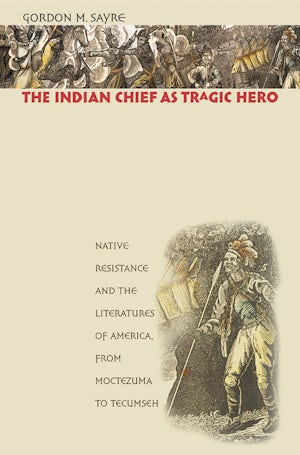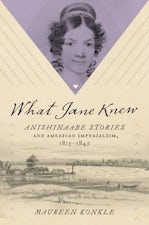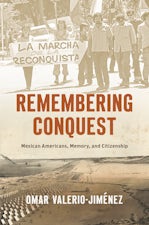The Indian Chief as Tragic Hero
Native Resistance and the Literatures of America, from Moctezuma to Tecumseh
By Gordon M. Sayre
368 pp., 6.125 x 9.25, 15 illus., notes, bibl., index
-
Paperback ISBN: 978-0-8078-5632-1
Published: October 2005 -
E-book EPUB ISBN: 978-0-8078-7701-2
Published: May 2006 -
E-book PDF ISBN: 979-8-8908-7949-3
Published: May 2006
Buy this Book
- Paperback $37.50
- E-Book $27.99
For Professors:
Free E-Exam Copies
With chapters on seven major resistance struggles, including the Pueblo Revolt of 1680 and the Natchez Massacre of 1729, The Indian Chief as Tragic Hero offers an analysis of not only the tragedies and epics written about these leaders, but also their own speeches and strategies, as recorded in archival sources and narratives by adversaries including Hernán Cortés, Antoine-Simon Le Page du Pratz, Joseph Doddridge, Robert Rogers, and William Henry Harrison.
Sayre concludes that these tragedies and epics about Native resistance laid the foundation for revolutionary culture and historiography in the three modern nations of North America, and that, at odds with the trope of the complaisant "vanishing Indian," these leaders presented colonizers with a cathartic reproof of past injustices.
About the Author
Gordon M. Sayre is professor of English at the University of Oregon. He is author of Les Sauvages Américains: Representations of Native Americans in French and English Colonial Literature and editor of American Captivity Narratives.
For more information about Gordon M. Sayre, visit
the
Author
Page.
Reviews
"While thought provoking and satisfying to the expert in early American colonial studies, at the same time Sayre renders an approachable introductory survey for the newcomer. . . . An excellent study with wide-ranging implications, which will stimulate research for many years."--Itinerario
"Sayre's work is an important addition to assist in our understanding of how Indian leaders were portrayed in literature and of the wider cultural needs fulfilled by the writers of such literature. This book will be of particular interest to academicians of early American literature and historians of the same period."--Louisiana History
"Extraordinarily rich in narrative detail and historical allusion. . . . [The Indian Chief as Tragic Hero] deserves the most serious attention not only for its breadth and depth of detail but for its historiographical argument about the value of literary study to historical understandings. . . . The book lays down a robust challenge to historians to pursue these questions further with comparable subtlety and learning."--American Historical Review
"This interdisciplinary volume is a complex and richly dense, but Sayre's very lucid style reveals the patterns within the complexities. The Indian Chief as Tragic Hero is a worthwhile addition to the literatures of a variety of academic fields."--Journal of American History
"Sayre works deftly with his multitude of sources; his book is a triumphant example of the benefits of interdisciplinarity and the inclusive approach to evidence."--Indiana Magazine of History
"A rich and suggestive study. . . . A reader will feel enriched by an enormous body of information about new and unfamiliar texts. . . . This book deserves a place on the growing shelf of work about the Atlantic world . . . it deals shrewdly and suggestively with the conflicts of European and Indian empires and nations in the New World."--William and Mary Quarterly




